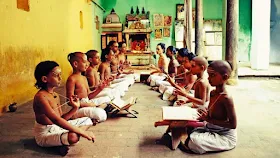IE Explore India: Mattur - Sanskrit Village of India
While India’s English-speaking millennial generation questions the usefulness of Sanskrit in present times, a tiny village in Karnataka has been not only preserving Sanskrit but also communicating in this ancient language for 40 years. Located 5km from Karnataka’s Shimoga district, Mattur is a quaint village of some 5000 people who chose Sanskrit over Kannada as the primary medium of education and day-to-day communication 40 years ago. Sushma Swaraj, the former Minister of External Affairs, had given an electrifying 20-minute speech in Mattur in 2005.
The way Sanskrit is taught and learned in the village is interwoven with various aspects of everyday life there. Kids are taught rhymes and told stories in Sanskrit right from the Montessori level. Only the Sanskrit edition of children’s comic books is allowed in the village schools and households. Even messages on civil awareness are written in Sanskrit on the roadside walls of mud houses in the village, for instance, “Maargaha swacchataya viraajithe, gramaha sujanai viraajithe” (cleanliness is as important for roads as good people are for a village). Some of the country’s Vedic scholars hail from Mattur and teach Sanskrit in universities across the world. Many foreign students from different parts of the globe travel to Mattur and learn Sanskrit there.
The villagers, a majority of whom migrated from Kerala 600 years ago, took an oath to save Sanskrit from the verge of extinction, on completion of a 10-day workshop organized by Sanskrit Bharati, an organization helming projects to promote Sanskrit. However, history has it that Mattur has been a center of learning for Sanskrit since before the Vijayanagara Empire in the late medieval period. Many Sanskrit-speaking youths of the village have gone abroad and have been employed by global conglomerates.
Mattur, an exemplary model on self-governance and agrarian economy, wakes up to Vedic chants even before sunrise and bids adieu to the setting Sun with the soulful chanting of Sanskrit shlokas at dusk.



No comments:
Post a Comment